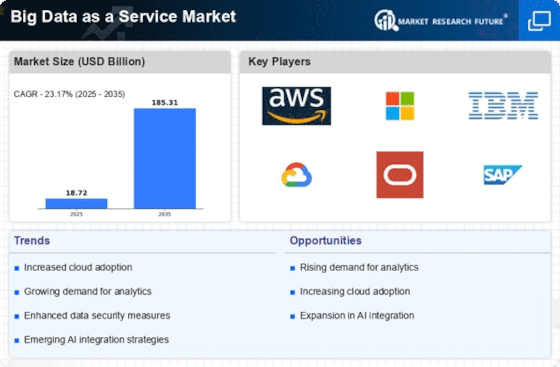Market Share
Big Data as a Service Market Share Analysis
The Big Data as a Service (BDaaS) market is heavily influenced by various market factors that shape its dynamics and growth trajectory. One of the key drivers propelling the expansion of BDaaS is the escalating volume of data generated globally. As businesses and organizations increasingly recognize the value of data-driven decision-making, there is a growing demand for efficient and scalable solutions to manage and analyze massive datasets. BDaaS provides a compelling solution by offering cloud-based platforms that allow users to access and process vast amounts of data without the need for extensive infrastructure investments.
Furthermore, the rapid advancements in technology, particularly in cloud computing and analytics, play a pivotal role in the evolution of the BDaaS market. The continuous improvement of data processing capabilities and the integration of artificial intelligence and machine learning contribute to the sophistication of BDaaS offerings. This, in turn, enhances the ability of businesses to extract meaningful insights from their data, fostering innovation and competitiveness in various industries.
The competitive landscape also significantly impacts the BDaaS market. With a multitude of players entering the arena, there is a constant drive for innovation and differentiation. Market competition prompts service providers to enhance their offerings, improve performance, and provide cost-effective solutions. This competition is beneficial for end-users, as it leads to a diverse range of BDaaS options, catering to different business needs and preferences.
Moreover, the regulatory environment plays a crucial role in shaping the BDaaS market. Data privacy and security concerns have become increasingly prominent, leading to the implementation of stringent regulations such as the General Data Protection Regulation (GDPR). Compliance with these regulations is imperative for BDaaS providers to gain and maintain the trust of their clients. As a result, the market is witnessing a surge in solutions that prioritize data security and privacy, thereby addressing the evolving regulatory landscape.
The scalability and flexibility offered by BDaaS solutions are additional factors driving market growth. Businesses, especially small and medium-sized enterprises (SMEs), benefit from the ability to scale their data infrastructure based on their evolving needs. This scalability not only allows for efficient resource utilization but also facilitates the adoption of BDaaS by a broader spectrum of organizations. The flexibility of BDaaS platforms enables users to choose specific services based on their requirements, promoting a customizable and cost-effective approach to data management and analytics.
On the flip side, challenges such as data integration complexities and the need for skilled professionals in data science and analytics can impede the widespread adoption of BDaaS. As organizations strive to harness the full potential of their data, overcoming these challenges becomes paramount. Industry stakeholders are actively working on addressing these issues through research and development initiatives, training programs, and strategic partnerships.


















Leave a Comment